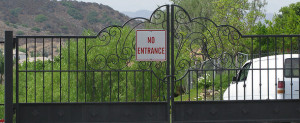 A fast-growing number of the magazines and newspapers that I read on line are now imposing rigid limits on free articles-per-month for non-subscribers. I know why they do it, and I couldn’t sympathize more. Even so, my guess is that most Americans respond to those limits by ceasing to read the publications that impose them—and given the vast amount of other good stuff to read that’s out there on the web, I can’t help but wonder about the future of journalism, mainstream and otherwise, in a country where fewer and fewer people are willing to pay for it.
A fast-growing number of the magazines and newspapers that I read on line are now imposing rigid limits on free articles-per-month for non-subscribers. I know why they do it, and I couldn’t sympathize more. Even so, my guess is that most Americans respond to those limits by ceasing to read the publications that impose them—and given the vast amount of other good stuff to read that’s out there on the web, I can’t help but wonder about the future of journalism, mainstream and otherwise, in a country where fewer and fewer people are willing to pay for it.
At the same time, though, I also find myself thinking that what once was a full-scale culture-wide “conversation” is now increasingly back-porch gossip in gated media communities. A country in which everybody self-selects whom to listen to is a country in which most people only hear what they want—and expect—to hear.
It strikes me that this constitutes a permanent change in American culture, and a highly significant one. It’s yet another unintended consequence of the demographic phenomenon known as “the big sort,” in which like-minded, similarly situated Americans increasingly prefer to live among their own kind, and are willing to move elsewhere in order to do so.
The British playwright David Hare, who is a socialist, said something quite striking in The Blue Touch Paper, his recently published memoir, about the character of Manhattan in the Sixties. He called it
a nineteenth-century city which took its character from the fact that the working class and the immigrants still lived in the middle of it. You could move around, eat in cheap places, stay in cheap hostels, go to cheap shows, because there were lots of people who lived in Manhattan who were far worse off than you were. It wasn’t just the famous racial mix, it was much more a mix of fortune which made life livable at the bottom, if never as luxurious as it was at the top.
But there were more places than Manhattan to which this description applied—and there was more to it than money. Many, perhaps most Americans of my generation (I was born in 1956) lived in places whose residents included people who read, liked, listened to, and thought all sorts of things, and who voted differently, even unpredictably, on election day. As a result, we learned to get along with one another, and sometimes we even learned from one another. At the very least, we learned—up to a point—to be reasonably tolerant of each other’s crotchets.
 More and more, though, we don’t live together and we don’t listen to each other. As a result, the modest but real tolerance of the past is increasingly giving way to attempts at outright repression, or (more often, at least for now) the sniggeringly dismissive attitude exemplified by this Washington Post story about Donald Trump’s taste in food:
More and more, though, we don’t live together and we don’t listen to each other. As a result, the modest but real tolerance of the past is increasingly giving way to attempts at outright repression, or (more often, at least for now) the sniggeringly dismissive attitude exemplified by this Washington Post story about Donald Trump’s taste in food:
For some people, what’s coming out of Donald Trump’s mouth is downright scary. Almost as frightening, at least to those of us who see the stomach as a window to the soul, is what is going in.
Wendy’s on his custom Boeing 757 while campaigning with Jerry Falwell Jr. in Iowa. McDonald’s with advisers during a swing through New Hampshire. Two eggs, bacon, sausage, hash browns and two biscuits at the Ham House during a pit stop in Greenville, S.C.
The world is his oyster, but that’s not what he’s consuming. The front-runner for the GOP presidential nomination eats like a teenage boy, inhaling Filets-o-Fish and Big Macs. “It’s great stuff,” he says of his fast-food habit. At a time when growing, cooking and enjoying food in the United States is yuuuuge, his preferences are surprisingly pedestrian—and passe, as if Alice Waters had never been born and food were fuel (albeit dirty gas as opposed to premium).
Note the transition from “some people” to “us.” As in: Not our kind, dearie. After which come the sneers. I’m no fan of Donald Trump—that’s putting it very, very mildly—but I also know that of such sneers are revolutions made.
This “news” story is, in its minor but nonetheless revealing way, illustrative of the condition that now increasingly prevails in American society, which is that those who disagree no longer have anything to say to each other. Fact-based argument has been replaced by reflexive contempt. Nor should this be in any way surprising. In a totally polarized political environment, persuasion is no longer possible: we believe what we believe, and nothing matters but class and power. We are well on the way to becoming a land of jerking knees.
Never before have I felt so strongly that Americans are talking past instead of to one another. It is, I fear, our future and our fate—which is why I have come to believe that I will live to see Red and Blue America negotiate a “soft disunion.” No, there won’t be a second civil war. I can’t imagine the citizens of Blue America waging a shooting war over much of anything, least of all continued union with people whom they disdain. (Red America is a different story.) But the gap that separates the two Americas has grown so deep and wide that I find it increasingly difficult to imagine their caring to function as a single nation for very much longer. If I’m right, then I expect that they will ultimately find a more or less polite way to stop doing so.
 The main obstacle that stands in the way of the soft disunion of America is that Red and Blue America are not geographically disjunct, as were the North and South in the Civil War. Even in the biggest and reddest of states, there are deep-blue enclaves that have no wish to be absorbed into the whole. Perhaps they will be the West Berlins of the twenty-first century, tiny islands of dissent in vast seas of concord. But if the desire to separate is strong enough, then the problem will surely be solved one way or another. Abraham Lincoln said it: “If destruction be our lot we must ourselves be its author and finisher. As a nation of freemen we must live through all time or die by suicide.” And so we may, sundered by inattention.
The main obstacle that stands in the way of the soft disunion of America is that Red and Blue America are not geographically disjunct, as were the North and South in the Civil War. Even in the biggest and reddest of states, there are deep-blue enclaves that have no wish to be absorbed into the whole. Perhaps they will be the West Berlins of the twenty-first century, tiny islands of dissent in vast seas of concord. But if the desire to separate is strong enough, then the problem will surely be solved one way or another. Abraham Lincoln said it: “If destruction be our lot we must ourselves be its author and finisher. As a nation of freemen we must live through all time or die by suicide.” And so we may, sundered by inattention.
And then…what? Given the present state of American presidential politics, I fear that few will lament the disintegration of the United States of America as it has previously been understood. Indeed, many may see it as blessed deliverance from the horrors of an increasingly unpeaceful cultural coexistence. But for those of us who love America, messy and confused as it is, soft disunion will be a terrible thing, no less terrible for having been effected politely.


